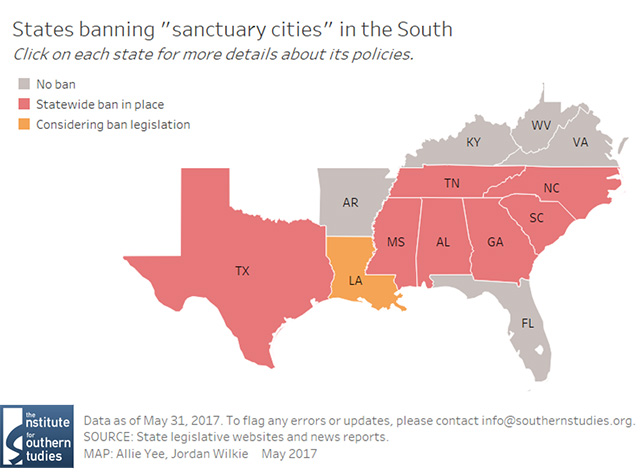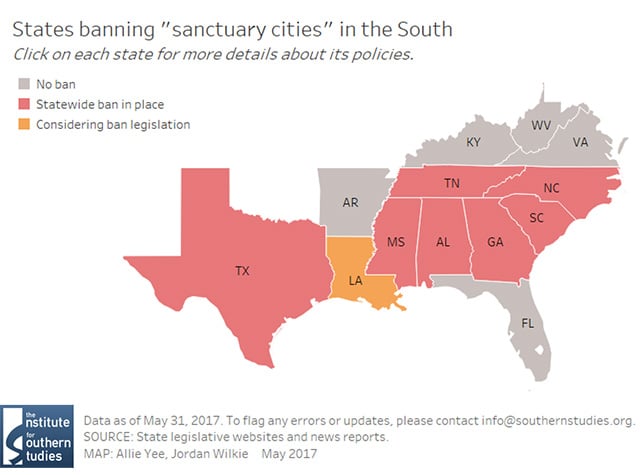
Hundreds of immigrant rights advocates from around the country converged on the Texas Capitol on Memorial Day to protest the state’s new anti-sanctuary law, Senate Bill 4. Protestors lined the galleries on the legislature’s final day and chanted, “Hey ho, hey ho, SB4 has got to go,” disrupting the proceedings until they were removed by state troopers.
The bill, signed by Gov. Greg Abbott (R) on May 7, is the crest of a wave of state laws spreading throughout the South that prohibit local governments from passing so-called “sanctuary policies” — local ordinances that limit police cooperation with federal immigration enforcement.
Texas’ SB4 is the harshest and most sweeping anti-sanctuary law yet, creating a litany of new rules around immigration enforcement. The law also introduces punishments for local governments found to be non-compliant with Immigration and Customs Enforcement (ICE) or other federal immigration officers, including:
- Fines of up to $25,500 per day.
- Removal of a person holding elective or appointive office.
- Charging sheriffs, chiefs of police, or constables with a class A misdemeanor, which can carry up to a year in prison and a $4,000 fine.
- Allowing law enforcement officers to ask people they detain about their immigration status.
Critics have compared the provision allowing police to ask about citizenship status to Arizona’s 2010 “show me your papers” law, which was largely struck down in the courts. Arizona’s law required police to ask for immigration papers if they suspected someone was in the country without documentation, whereas Texas’ law only gives police the ability to ask rather than requiring it.
Police chiefs across Texas, including interim Dallas Chief David Pughes and Houston Chief Art Acevedo, say SB4 will hurt public safety by eroding trust between immigrant communities and the police.
According to a Facing South analysis of statewide sanctuary bans, the first anti-sanctuary bill was passed in 2008 in Missouri, the only state outside of the South to pass such a measure. Georgia and Tennessee followed suit in 2009, trailed by Alabama, South Carolina, North Carolina, Mississippi, and now Texas.
These laws are part of an ongoing strategy of conservative Southern states preempting local ordinances coming out the region’s increasingly progressive cities, a tactic made infamous by North Carolina’s HB2 “bathroom bill.”

In Texas, SB4 is set to go into effect on Sept. 1, though it will have to clear mounting legal hurdles before then. The border town of El Cenizo was the first to file a lawsuit, joined by the League of United Latin American Citizens, Maverick County, and the ACLU. The suit claims SB4 violates several constitutional protections, including the sovereign rights of local governments and due process requirements.
El Paso County is also suing over the law. This week, Austin and San Antonio became the first major cities to file suit, with discussions about legal action also underway in Dallas.
Join us in defending the truth before it’s too late
The future of independent journalism is uncertain, and the consequences of losing it are too grave to ignore. To ensure Truthout remains safe, strong, and free, we need to raise $43,000 in the next 6 days. Every dollar raised goes directly toward the costs of producing news you can trust.
Please give what you can — because by supporting us with a tax-deductible donation, you’re not just preserving a source of news, you’re helping to safeguard what’s left of our democracy.